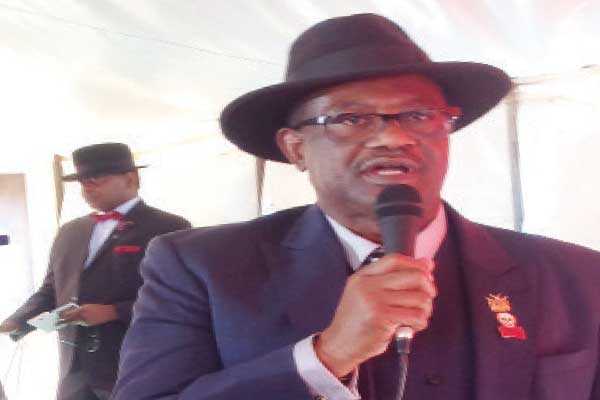Ovaherero recall pain of German genocide
It was an event meant to celebrate the life and bravery of the late Kgosi Samuel Bimbo of Omaueneno village near Tsabong. However, it turned into a sombre ceremony as many a speaker recalled the four years, in 1904 until 1908, of German soldiers’ brutally killing over 65, 000 ethnic Ovaherero in Namibia the then South West Africa at the time.
This past Saturday, many speakers at the unveiling of Kgosi Samuel Bimbo’s tombstone, including the Ovaherero Traditional Authority Paramount Chief, Advocate Vekuii Rukoro recalled deep wounds of suffering at the hands of the Germans that led to the Ovaherero and Nama fleeing to countries such as Botswana and South Africa.Reverend Rupert Hambira left the stage in tears as he quoted from the Holy Bible. Former Permanent Secretary in the ministry of Agriculture Dr. Mircus Chimbombi described the event as painful and evoking sore memories.
“Foxes have dens and birds have nests, but the Son of Man has no place to lay his head,” said Hambira as he quoted from the book of Luke 9:58. Before then, he said the Ovaherero tribe suffered a lot during the war against the Germans. “We were forever on the run,” he said. Germany’s crackdown on Ovaherero in 1904 to 1908 was under the commandership of Lieutenant-General Lothar von Trotha. According to Isabel V. Hull of the Cornell University, the military campaign in Southwest Africa in 1904–1907 was the largest and in every respect the costliest undertaken by Imperial Germany before World War I.
It began in response to a revolt by the Herero who were angered by the dispossession of their land, the death of their cattle in a series of epidemics, and their treatment at the hands of settlers and colonial officials. Speaking over the weekend, Paramount Chief Rukoro said there is nothing as cruel compared to the Ovaherero and Nama genocide. “But there is one thing that is even worse, than the physical genocide and that is the cultural genocide of the people. This is when people have lost their cultural identity and their language,” he said. The Ovaherero in Omauaneno and Tsabong have lost their culture and language. Many of them speak Sekgothu and do not wear the traditional attire of the Ovaherero tribe.
According to Moses Chimbombi of Ritungee Association in Kgalagadi South, which houses Omaueneno and Tsabong, “our Herero culture has reached a cul de sac.” But he noted that they have not lost their culture and language by choice. “We are not lesser Herero,” he stated as a matter of fact before calling for an institution where their children can be taught the language in the area. Rukoro stated in his speech that he understood Ritungee’s pleas, but tore at the German government for refusing to compensate Ovaherero and Nama. “This is what the German government does not seem to understand. This is what the Namibian government does not seem to understand when it says it wants to speak for us but without us,” he said. Ovaherero and Nama are currently engaged in a heated reparation battle. The tribes have approached the International Tribunal in The Hague on the issue as the German government is refusing to negotiate with the affected tribes but rather with the Namibian government.
Rukoro tore at African governments in particular the SADC region saying they are just standing aside as spectators and witness as “we powerless Ovaherero and Nama are taking on the mighty imperialist government of Germany.” He said, “this is what our African brothers and sisters especially African presidents don’t seem to understand and appreciate when they do not extend solidarity to us in this fight against the results of a genocide which was committed against us and which effects we are still feeling today.” According to him African presidents continue to sip champagne and cocktails with the Germans and not show solidarity with Ovaherero and Nama who continue to suffer cultural genocide of the German actions. The Paramount Chief has previously made appeals to SADC and the African Union for help in the matter but according to him none of the two organisations heeded their plea. Rukoro argues that the Namibian government should be there as a witness not as negotiator.
“We feel that the blood of our parents should be compensated. Our view is that we don’t trust the Namibian government to negotiate for us in our absence.” According to him Ovaherero and Nama in Botswana, South Africa and those in the Diaspora should be part of the negotiations. “They seem not to know that there are Ovaherero and Nama in Botswana and South Africa. We tell the government that the people in South Africa and Botswana are witness enough about the genocide. We say there should be representatives from Botswana and South Africa.”
Meanwhile, Rukoro said there is a need to have an institution in Omauaneno where “we can start teaching our people here the culture, traditions and the language of our people.” At the event there were those who blamed Christianity saying it also brought ills against the tribes noting that church ministers were also involved in the genocide.“People were killed in church while praying,” said Jacob Kapeko.
Moses Chichindua from South Africa also recalled how the Germans sent church ministers into the Lutheran church to look for Ovaherero and kill them. Meanwhile, Rev Rupert Hambira argued that while Kapeko was right about the ills of Christianity, the one thing that was good about the late Kgosi Samuel Bimbo is that he held dearly to Christianity. “And by doing so a school was brought to them. We are a very educated tribe, we have acquired education. Christianity opened that gate that nothing else could have opened,” he said.






